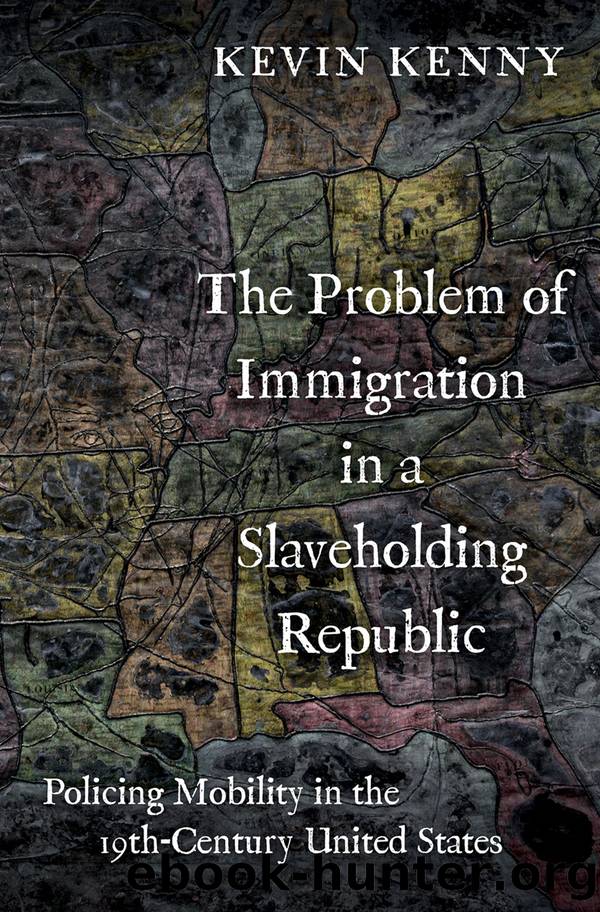The Problem of Immigration in a Slaveholding Republic by Kevin Kenny

Author:Kevin Kenny
Language: eng
Format: epub
Publisher: Oxford University Press
Published: 2023-04-15T00:00:00+00:00
Civil Rights and Citizenship
Within a month of the abolition of slavery in December 1865, the coauthor of the Thirteenth Amendment, Senator Lyman Trumbull of Illinois, introduced the first civil rights bill in American history. Unlike more radical members of the Republican Party, Trumbull did not want the bill to address social equality or political rights. Asked in the Senate debates to explain what he meant by the term âcivil rights,â Trumbull replied that the first section of the proposed bill provided the answer: âThe right to make and enforce contracts, to sue and be sued, to give evidence, to inherit, purchase, sell, lease, hold, and convey real and personal property, and to full and equal benefit to all laws and proceedings for the security of person and property.â As distinct from political rights or social equality, these were âfundamental rights belonging to every man as a free man, and which under the Constitution as it now exists we have a right to protect every man in.â Voting remained a privilege, rather than a right pertaining to citizenship.4
Opposition to the civil rights bill focused on two related questions. Did the federal government have the power to define and protect rights of this kind? And what sorts of people would enjoy these rights? Senator Willard Saulsbury Sr., Democrat of Delaware, denounced the bill as âone of the most dangerous ever introduced into the Senate of the United States, or to which the attention of the American people was ever invited.â Citing Gibbons v. Ogden (1824) and New York v. Miln (1837), Saulsbury insisted that the framers of the Constitution had intended all the powers embraced by the proposed bill to be reserved exclusively to the states. Congressman Michael Kerr, Democrat of Indiana, warned that if Congress had the power to pass the bill, it could also force his state to admit ânegroes or mulattoes, coolies or Mexicans, Hottentots or Bushmenâ (derogatory terms for the Indigenous people of southern Africa, used here to describe Africans in general). The United States, Kerr predicted, would become âsubstantially Africanized, Mexicanized or Coolyized.â5
Opponents of the civil rights bill demanded to know on what basis formerly enslaved people could become United States citizens, as well as the implications for naturalizing nonwhite immigrants. Senator Peter Van Winkle, a Republican/Unionist from West Virginia who supported President Andrew Johnson, asked Trumbull, âif these Africans are not now citizens of the United States, where is the authority by law of Congress to make them citizens?â Echoing the Dred Scott decision, Van Winkle claimed that African Americans were not part of the American people when the Constitution was established and that extending citizenship to them would require a constitutional amendment. This question, he warned, involved ânot only the negro race, but other inferior races that are now settling on our Pacific coast, and perhaps involves a future immigration to this country of which we have no conception.â Trumbull replied that the naturalization clause in the Constitution gave Congress the power to establish whatever naturalization process it wished.
Download
This site does not store any files on its server. We only index and link to content provided by other sites. Please contact the content providers to delete copyright contents if any and email us, we'll remove relevant links or contents immediately.
| Africa | Americas |
| Arctic & Antarctica | Asia |
| Australia & Oceania | Europe |
| Middle East | Russia |
| United States | World |
| Ancient Civilizations | Military |
| Historical Study & Educational Resources |
Machine Learning at Scale with H2O by Gregory Keys | David Whiting(4280)
Never by Ken Follett(3917)
Fairy Tale by Stephen King(3352)
Oathbringer (The Stormlight Archive, Book 3) by Brandon Sanderson(3108)
The Man Who Died Twice by Richard Osman(3054)
Will by Will Smith(2891)
Rationality by Steven Pinker(2340)
Can't Hurt Me: Master Your Mind and Defy the Odds - Clean Edition by David Goggins(2309)
The Dark Hours by Michael Connelly(2289)
Friends, Lovers, and the Big Terrible Thing by Matthew Perry(2208)
The Dawn of Everything: A New History of Humanity by David Graeber & David Wengrow(2177)
Principles for Dealing With the Changing World Order: Why Nations Succeed and Fail by Ray Dalio(2028)
HBR's 10 Must Reads 2022 by Harvard Business Review(1828)
A Short History of War by Jeremy Black(1827)
Go Tell the Bees That I Am Gone by Diana Gabaldon(1743)
A Game of Thrones (The Illustrated Edition) by George R. R. Martin(1691)
515945210 by Unknown(1653)
Kingdom of Ash by Maas Sarah J(1651)
443319537 by Unknown(1534)
